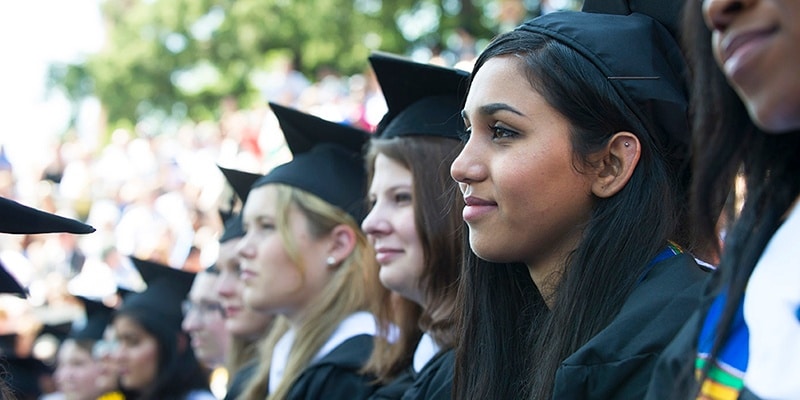NEW YORK (WOMENSENEWS) So far, Yarialis Guzman, a Dominican American who identifies as Hispanic, hasn't had a crush on a black guy. But if it happens, the shy 16-year-old sophomore at Manhattan Center for Science and Math said her parents likely won't be happy.
“My mom would have a heart attack or she would try to force me to stop or think it over,” she said in a recent interview at her school. “My dad would just be like depressed and really sad about it. Most of the time my parents believe in the stereotypes of black boys because around the area I live in there's a lot of black people and they see their ‘thuggish' ways,” said Guzman, making air quotation marks to characterize her parents' views.
Guzman's situation is just one example of the inter-generational tensions that can arise in some Dominican American families because of inter-racial dating, a drama played out in many other previous generations of close-knit communities.
Four other Dominican girls, who go to the same school as Guzman in the Upper East Side in Harlem's El Barrio, said they'd also face extreme disapproval from their parents if they dated teens with African ancestry.
Peyano, who is dating an African American boy now, says her parents feel like her boyfriend is a tiguere, which is another word for a “thug.”
She says her parents have never approved of her boyfriend, but that could have more to do with her choice in boyfriends since hers falls within the “bad boy” category. Still, she says her parents would be less critical if her boyfriend were Hispanic and without African ancestry.
Though the teens disagree with their parents' sentiments, they said it can still affect their dating preferences and views of African Americans in general.
“My parents feel like [African American] people need to be more educated and less loud,” said Francheli Peyano, 17, a Bronx resident. “But my dad does believe there are some black people that are decent.”
Colorism Strikes Home
Reflecting the international skin-color bias, Peyano's father's side of the family has dark skin and her mother's side is light. “My mother feels like she ruined her family because she's light-skin and nobody in her family is dark except her kids,” said Peyano.
Peyano's mother, Elizandra Peyano, 35, said skin color is not the primary consideration for who dates her daughter. “Decency and education” are the main factors. However, she added, skin color can be a factor. “If he's decent and light skin, that's a plus.”
All the girls interviewed said their parents encouraged them to date fair-skinned men or to date within the Dominican community.
Dahiana Pena, 16, said her parents would prefer her to date someone who's Dominican, but they let her make her own decisions. But despite their leniency, she said her family still has racist views. “There's definitely racist remarks that still remain in our culture,” she said, referring to such Spanish terms as “cocolo” and “negro” that are used to refer to African Americans.
“I feel like the white image has always been praised,” said Pena. “You can even see it when they talk about our hair. They say ‘do your hair' when they talk about straightening it. I feel like it would just be better off if I dated someone that was Hispanic.”
These expectations are not exclusive to Dominican girls.
One African American female teen, who asked to go by Anne Lynn, said in an email interview that despite being with her Dominican boyfriend for three years, his parents have not been receptive of their relationship. She said that although her boyfriend has spoken to his parents about being more accepting of her, she can still feel the tension when she's around them.
‘Maybe They're Scared'
“Maybe they're scared of the unknown or they have certain preconceived notions about what a girl of my skin color is supposed to act like and they disapprove,” said Lynn who is 18-years-old and lives in Washington, D.C. “It just sucks because I've tried to show them that I'm there for the right reasons.”
The race relations in these teens' private lives are playing out on a larger, historical scale. In 2015 the Dominican Republic was widely denounced for deporting thousands of Dominicans of Haitian descent. Critics described the mass deportation as a racist move against people who are predominantly black.
A source of the country's anti-black sentiment is Rafael Trujillo, the military strongman who led the country from 1930 until his assassination in 1961. Trujillo, who was rumored to have worn face powder to appear lighter, had an infatuation with “whitening the race” and ordered the killing of thousands of Haitians in what is now called the Parsley Massacre.
Peyano says that her native-born Dominican parents often sympathize with this sentiment, one that could strongly influence the intergenerational discussion.
Changing Perceptions
These teens don't take everything their parents tell them to heart. As first-generation immigrants, many are growing up in an environment that includes discussions of systemic racism and how media portrayal can affect perceptions.
Some of this is reflected in a torrent of postings and comments that the teens find on their Facebook and Instagram accounts.
“You Dominican girls love black men but your families don't” reads one post found on Facebook. Another one on Twitter reads, “Dominican parents hate black people in real life. But you already know their daughters be like ‘oh well'.”
But, not every Dominican family opposes their daughter dating an African American boy. Nicole Rivera, a senior at Manhattan Center, said her parents don't mind who she dates. “They never told me not to date an African American boy. They basically just told me to do what makes me happy, even if that means dating a black boy.”
Blogs like those of Revolutionary Afro-Latino and Radical Latina are leading the way in a more inclusive and dynamic view of what it means to be Dominican. More and more Dominican teens of African descent are learning about their blackness and embracing it.
Lucy Perez, 17, a senior who lives in Manhattan, said who she dates is ultimately up to her.
“After speaking to my mom, I told her that if I find a guy attractive and I think he's worth being in my life, like someone serious, then it shouldn't matter what his race is,” she said. “She was upset at first but she understands and it's true.”


